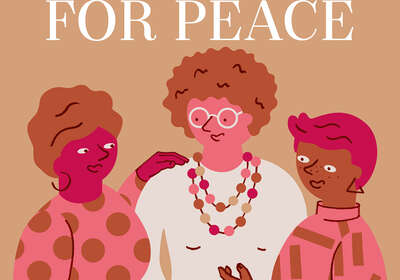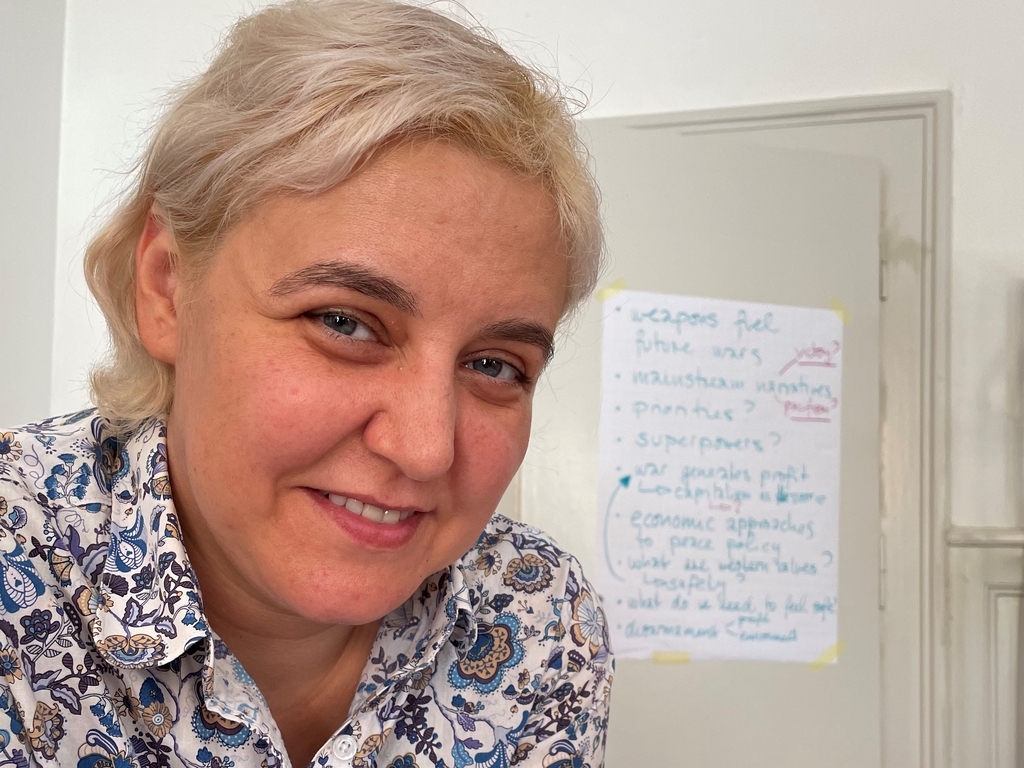Publication: "Feminists Connecting for Peace" 2
The second issue of the magazine is dedicated to the topic of "Security".


The war in Ukraine has led to the increasing celebration of toxic masculinity in the region. As a result, male identity is experiencing a serious crisis that affects a large number of men and women, writes Belarusian peace activist Olga Karatch in her article in the 2. edition of the "Feminists Connecting for Peace" magazine. She lists five ways to counter these patriarchal narratives.
It is difficult for any woman to admit that the man who is socially celebrated as a hero is abusing her at home.
The war in Ukraine, along with the closely related processes of romanticizing war and the rapid growth of militarization in the region (Belarus, Baltic States, Ukraine, Russian Federation, Poland), has led to the increasing celebration of toxic/brutal masculinity (in essence, the identity of an abuser) as the only correct masculine role model. As a result, male identity is experiencing a serious crisis that affects a large number of men and women. The hierarchical segmentation of the societies as well as a rise of patriarchal narratives and attitudes in our region are increasing even in unexpected spheres such as the independent Belarusian media, for example.
The men’s groups who have been impacted by toxic, militarized masculinity are often not perceived as "real men", and therefore face the pressure of public opinion. These groups include:
● Men who refuse to take up arms and join the military or who have served in the military and wish to leave for various reasons,
● Former Ukrainian and Belarusian combatants who have been wounded and are unable to continue fighting. They face difficulties to socially reintegrate and readjust to civilian life. Also, many of them feel guilt, resentment, and disappointment, and some of them suffer from mental health issues, which are highly tabooed and painful issues,
● Former male political prisoners from Belarus who left the country are facing pressure from the protesting diaspora community demanding their participation in Ukrainian military actions, however, they are unwilling or afraid to do so, and
● LGBTQI+-individuals who do not conform to the traditional gender role of being the protector and provider of the family.
This reinforcement of toxic masculinity as the only correct role model for men also affects women: There is an increase of intrafamilial domestic violence since men are socially perceived as heroes, particularly Ukrainian former combatants and Belarusian former political prisoners and combatants fighting on the side of Ukraine (many Belarusian fighters who were imprisoned due to the 2020 protests are fighting for Ukraine as they are in solidarity with them and as they want to gain combat experience to go back to Belarus to free it from Lukashenko’s dictatorship with weapons in their hands). The problem of domestic violence is being silenced because families do not know what to do about it or how to deal with it. It is difficult for any woman to admit that the man who is socially celebrated as a hero is abusing her at home. Her hands are tied because she lacks the experience to stop it and fears social condemnation and victim-blaming.
Safe spaces for migrant women from Belarus, Russia, and Ukraine have practically disappeared. Radical right-wing men are engaging in persistent acts of aggression and hostility towards migrant women. In the whole region, including in the Baltic countries, women leaders at grassroots level need international support.
Talking about war has become a taboo
The widespread objectification and the systematic exclusion of women from decision-making processes is a pressing concern. The voices of feminists are either unheard, distorted, or manipulated for political purposes. Women, influenced by patriarchal militaristic propaganda, compel their men to go to war. Therefore, it is crucial to amplify the voices of women who work with a feminist approach and are sensitive towards gender issues.
We have lost the focus on the most crucial level – grassroots – where predominantly women work with refugees, children, marginalized groups, or people in extreme poverty. Due to the lack of attention, burnout, and chronic fatigue, the grassroot activists lose their motivation, and hence, their networks slowly fall apart. Women who have been traumatized by the war in Ukraine or terror in Belarus find themselves in a marginalized position with a lack of public attention towards their social, economic, psychological, and other issues. Talking about peace has become a huge taboo: Women who talk about peace or participate in peacebuilding efforts face new threats and risks like harassment, threats of physical violence and death.
Going forth, the competencies and knowledge of the international peacebuilding organizations and transnational feminist movement are only used to a very limited, uncoordinated extent, even though there are numerous opportunities to use their skills by providing assistance to conscientious objectors, supporting traumatized people, or strengthening local communities.
Countering patriarchal narratives
Due to this background, the following recommendations can be made:
First, the UN Resolution 1325 must be implemented for an effective involvement of women in decision-making processes in peacebuilding activities. Women peacebuilders who work in high-risk situations, even within EU countries, and at the grassroots level with local communities must be empowered and supported, as well as their rights must be defended.
Second, men who are facing significant challenges due to the spread of patriarchal narratives – particularly conscientious objectors and deserters – must be supported.
Third, conflict prevention and peaceful conflict resolution, including assistance in facilitating trauma work for former combatants and their families, should be particularly emphasized.
Fourth, all forms of violence against women, whether it be wartime sexual violence or domestic violence within the families mainly of former political prisoners or combatants, must be combatted. The trauma work focusing on children and women needs improvement.
Fifth, in all activities, feminist approaches and narratives must be strengthened as a counterbalance to the dominant militaristic patriarchal narratives and toxic/brutal masculinity.
Last but not least, these recommendations need financial resources to be implemented.
From a feminist peace activists’ perspective, the implementation of these recommendations will determine whether radical sentiments grow and how much the war will impact all countries and social segments within this region and beyond. Compared to former times, the situation in terms of the tolerance of violence and brutality has changed for the worse, society has become even more brutal, and violence is reinforced and rewarded after the last events in the region.